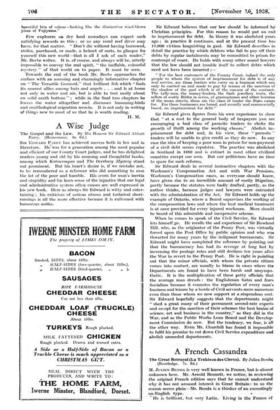A Wise Judge The Gospel and the Law. By His
Honour Sir Edward Abbott Parry. (Heinemann. 8s. 6d.) SIR EDWARD PARRY has achieved success both in law and in literature. He was for a generation among the most popular and efficient of our County Court judges, and he has delighted readers young and old by his amusing and thoughtful books, among which Kotawonipus and The Overbury Mystery stand out prominent. But his heart's desire is, if we mistake not, to be remembered as a reformer who did something to ease the lot of the poor and humble. His scorn for man's inertia and stupidity, and his keen sense of the injustice that our legal and adininis,trative system often causes are well expressed in his new book. Here as always Sir Edward is witty and enter- taining; his criticism of serious abuses and technical short- comings is all the more effective because it is enlivened with humorous asides. Sir Edward -believes that our law should he informed by Christian principles. For this reason he would put an end to imprisonment for debt. In theory it was abolished years ago ; in practice It continues, and at the present time has
11,000 victims languishing in gaol. Sir Edward describes in detail the practice by which debtors who fail to pay off their debts by regular instalments may be committed to prison for contempt of court. He holds with many other sound lawyers that the law should not trouble itself to collect debts which need not have been incurred :—
" For the best customers of the County Court, indeed the only people to whom the system of imprisonment for debt is of any real service, are those traders who carry on a business which can only be carried on and made to pay by reason of the sanction of the shadow of the gaol which is of the essence of the contract. The tally-men, the money-lenders, the flash jewellery touts, the' sellers of costly Bibles in series, of gramophones and other luxuries of the mean streets, these are the class of lender the State- caters for. For these businesses are based, and soundly and conimercially: based, on imprisonment for debt."
Sir Edward gives figures from his own experience to show that "at a cost to the general body of taxpayers you are encouraging a bad class of parasite traders to choke the growth of thrift among the working classes." Abolish hn- prisonment for debt and, in his view, these " parasite " traders will be unable to give credit as they do now. In any case the idea of keeping a poor man in prison for non-payment of a civil debt seems repulsive. The practice was abolished in Scotland in 1880 and is extinct in most other civilized countries except our own. But our politicians have no time to spare for such reforms.
Sir Edward deals in several instructive chapters with the Workmen's Compensation Act and with War Pensions. Workmen's Compensation cases, as everyone should know, have given rise to an incredible amount of costly litigation, partly because the statutes were badly drafted, partly, as the author thinks, because judges and lawyers were entrusted with the administration of the Act. Sir Edward holds up the example of Ontario, where a Board supervises the working of the compensation laws and where the best medical treatment is at once provided for every injured workman. More should be beard of this admirable and inexpensive scheme.
When he comes to speak of the Civil Service, Sir Edward lets himself go. He recalls the sad experience of Sir Rowland Hill, who, as the originator of the Penny Post, was virtually forced upon the Post Office by public opinion and who was thwarted for many years by the indignant bureaucrats. Sir Edward might have completed the reference by pointing out that the bureaucracy has had its revenge at long last by increasing the postage rates and still declines ten years after the War to revert to the Penny Post. He is right in pointing out that the minor officials, with whom the private citizen comes into contact, are usually to blame in cases where the Departments are found to have been harsh and unsympa. thetic. It is the multiplication of these petty officials that the average man dreads : the Englishman hates and fears Socialism because it connotes the regulation of every man's business and leisure by a horde of Civil servants more numerous even than those whom we now support at a stupendous cost. Sir Edward hopefully suggests that the departments might "shed a great many of their permanent second-rate experts and co-opt for the sanction of their schemes the best brains of science, art and business in the country," as they did hi the War, and as the Public Works Loan Board and the Develop- ment Commission do now. But the tendency, we fear, is all the other way. Even Mr. Churchill has found it impossible' to fulfil his promise to cut down Civil Service expenditure and abolish unneeded departments.












































 Previous page
Previous page